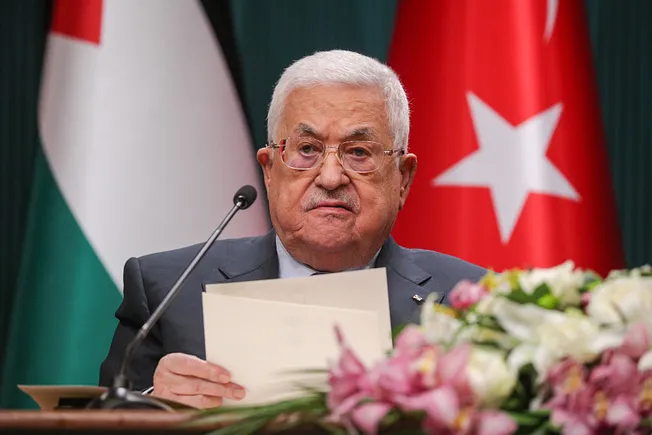This article is taken from The Free Press’s daily newsletter. To get the best of the news delivered to your inbox every morning, sign up here:
It’s been clear since October 7 that no sustainable peace between Israelis and Palestinians is possible as long as Hamas has power in Gaza. And so, the question is: Who should lead in Gaza once Hamas is destroyed?
Secretary of State Anthony Blinken has backed the idea of giving control to the Palestinian Authority that runs the West Bank. The PA, notoriously corrupt, has been run since 2005 by Mahmoud Abbas, who is now 88.
Is there a way to encourage newer and better Palestinian leadership? Douglas J. Feith, a senior fellow at the Hudson Institute who served as Under Secretary of Defense for Policy in the George W. Bush administration, thinks so. Here’s his proposal:
The Gaza war is a chance for Palestinians, with outside help, to make a quantum-leap improvement in their politics and society. And that starts with leadership.
Western countries and perhaps Arab states will inevitably send large sums of reconstruction aid to Gaza after the conflict.
They should use that money to empower a new elite in the territory.
The United States can help arrange to channel the aid through some kind of body whose governors would include Palestinians committed to conditions set by the donors. The main conditions should be radical but hard to argue against:
(1) don’t steal the funds,
(2) fund only civilian projects, and
(3) don’t promote hatred of Israel or the donor countries.
There could also be more specific guidance; for example, construct permanent housing rather than rebuild “refugee camps,” and require schools to promote nonviolent resolution of disputes rather than extremism. This would be the opposite of the approach taken for 75 years by the UN agency for Palestinian relief (UNRWA), which has dedicated itself to perpetuating the war against Israel.
Palestinians agreeing to administer the reconstruction would need security for themselves and their families, who might have to be removed to safe places abroad, as the current Palestinian leaders would see them as enemies.
The Gaza war is a major historical event, and donors can set goals accordingly. They need not be content to aim for minor reforms of current institutions. What is needed is serious improvement in the political culture. There is no harm in trying to move substantially beyond the status quo.
It would be wasteful (at best) to put reconstruction aid into the hands of the PA or UNRWA, let alone Hamas. The existing political institutions are the problem, not the solution. A random set of Palestinian businesspeople would do a better job than the leaders now in power.
The aid donors can draw on the talents of Palestinian engineers, medical doctors, and lawyers, especially Palestinians who have lived in the West and know firsthand the benefits of living under the rule of law. What is crucial is that the new administrators do not come from the ranks of the PLO (which runs the PA), Hamas, or other terrorist or extremist groups.
There are capable Palestinians who are not ideologically extreme. The aid donors’ challenge is to recruit those who might have the courage, integrity, and ability to spend aid money properly. It bears repeating that this means using the funds to buy not explosives, rockets, and tunnels for terrorist attacks, but apartment buildings, sanitation systems, power plants, and financial support for farms and factories. It should finance schools that teach useful skills rather than indoctrinating kids to become martyrs in hopes of destroying Israel and the West.
The Palestinian people have never had such leadership. They have never benefited as they should from the billions of aid dollars donated to help them. And the aid donors—shamefully—have never before actually insisted that their funds be spent properly.
Would the newly empowered Palestinians have legitimacy? Not at first, but no Palestinian leader now has a democratic mandate. The issue is not democracy but effective, relatively humane administration. And once in place, new leaders may garner support if they use the aid to improve their people’s lives, without enriching themselves or provoking war with Israel.
Better Palestinian leadership would serve not only Palestinian interests but also those of Israel, the United States, and much of the world. The effort may not succeed. But the alternative is to retain the current disastrously bad actors. For all President Biden’s talk of a “two-state solution,” there’s not even a glimmer of a chance of that outcome without change at the top of Palestinian society.
It is hard to overstate the significance of bad leadership. For over a hundred years, violent, self-serving authoritarians have failed the Palestinian Arabs, producing neither general prosperity nor statehood, but only endless unsuccessful war against the Jews.
Many of the millions of Palestinians are accomplished people who, under the right circumstances, could provide better leadership than Haj Amin, Yasser Arafat, or Mahmoud Abbas has done. It’s a low bar. We should help decent people hurdle it.
Douglas J. Feith, a senior fellow at Hudson Institute, served as Under Secretary of Defense for Policy in the George W. Bush administration.
Become a Free Press subscriber today:








